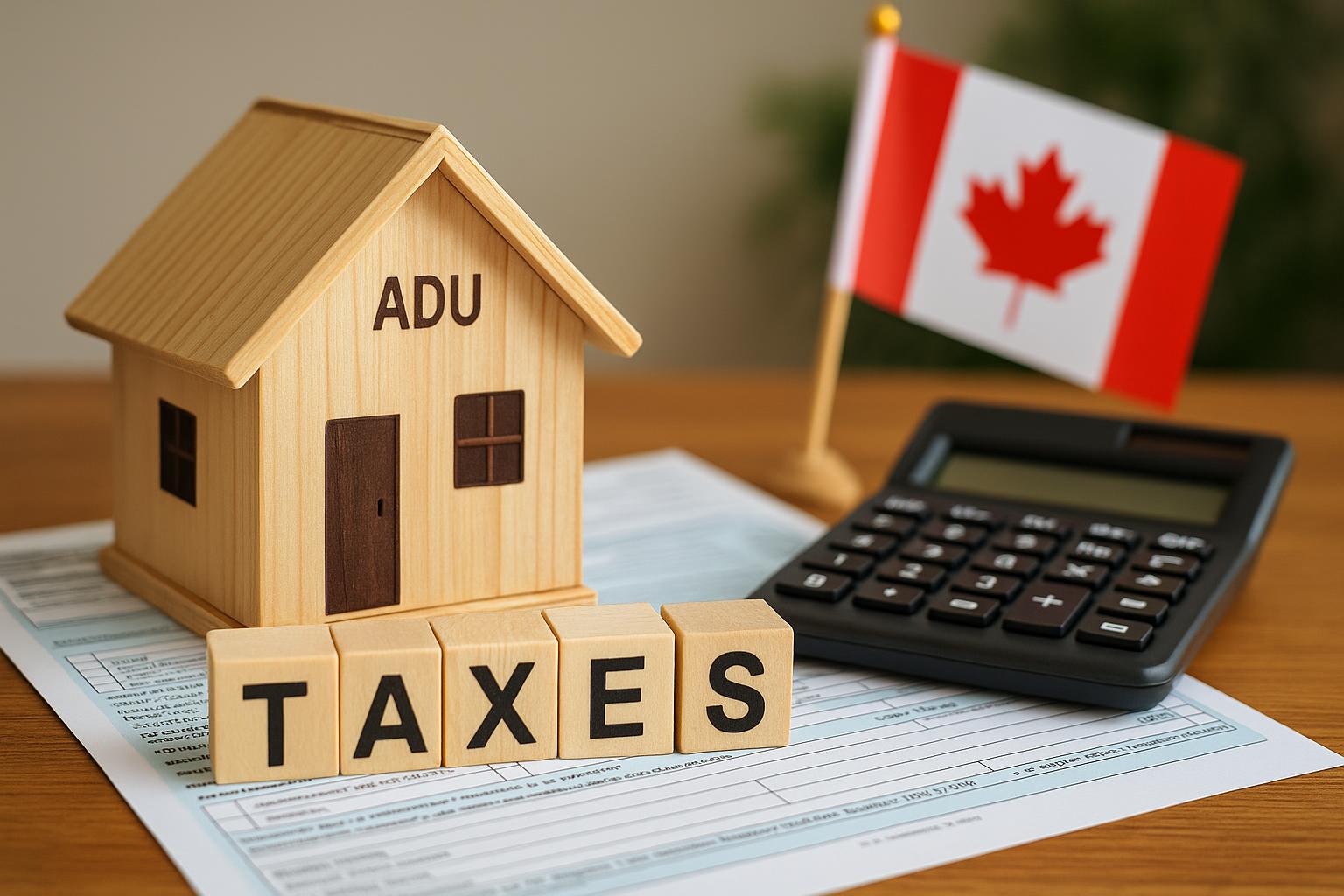
Navigating ADU Taxes in Canadian Real Estate: What Homeowners and Investors Need to Know
Estimated reading time: 8 minutes
Key Takeaways
- ADU taxes can significantly affect property assessments, rental income, and capital gains.
- Adding an ADU may increase your property’s assessed value leading to higher property taxes.
- Rental income from an ADU must be reported and related expenses properly documented.
- Local, provincial, and municipal differences require careful research and professional advice.
- There are potential tax benefits and incentives that can offset some costs associated with ADUs.
Table of contents
- Overview of ADU Taxes in Canada
- Property Assessment: ADU Taxes and Your Home’s Value
- Rental Income Tax: Reporting Revenue from Your ADU
- Capital Gains: Selling Canadian Real Estate with an ADU
- Tax Benefits and Incentives for ADUs in Canadian Real Estate
- Common Tax Pitfalls and Considerations for ADU Owners
- Conclusion
- Frequently Asked Questions
Overview of ADU Taxes in Canada
Accessory dwelling units (ADUs) have changed the face of Canadian real estate. As a homeowner or investor, understanding ADU taxes is crucial. These taxes can include:
- Property taxes: The addition of an ADU generally increases your property’s assessed value, which can lead to a higher tax bill. For further details, visit How a Secondary Unit Can Boost Property Value and Rental Income: Key Benefits for Canadian Homeowners.
- Rental income tax: Income earned from renting an ADU must be reported following standard income tax rules. Learn more at Optimizing Your Rental Unit for Maximum Profitability.
- Capital gains tax: Selling a property that includes a rental ADU may trigger taxable capital gains.
- Municipal fees and local taxes: Some municipalities impose additional fees or surcharges for maintaining an ADU.
Each province or municipality may have different rules, including exemptions or unique fees. For instance, the City of Windsor provides clear guidelines on these matters, while XpertSource highlights regional variations.
Property Assessment: ADU Taxes and Your Home’s Value
How Property Assessments Work
A property assessment is conducted by local governments to estimate your home’s market value, which in turn sets your property taxes. When you build an ADU, your property’s value is often recalculated, potentially increasing your taxes. For additional information, refer to Backyard Cottage: The Practical Canadian Guide to Design, Value, Zoning, DIY Building, and More.
Assessment Methods
- Some municipalities calculate the new value using the construction cost of your ADU.
- Others compare market values of similar properties with ADUs.
For example, the City of Windsor uses guidelines balancing construction costs with market value (City Windsor), while Vigohouse explains the impact of different ADU types on assessed value.
Provincial and Municipal Differences
- Different rules for assessments across regions.
- Possible exemptions or incentives in certain areas.
- For instance, Prince Edward Island supports ADUs but notes possible changes in property taxes (Prince Edward Island).
It is essential to check local rules and prepare for any increase in annual property taxes following ADU construction.
Rental Income Tax: Reporting Revenue from Your ADU
Renting out an ADU provides an additional income stream, but remember that the Canada Revenue Agency (CRA) considers this rental income taxable. If your ADU is used as a rental property, you must:
- Report all rental income on your annual tax return using Form T776 (Statement of Real Estate Rentals).
- Declare the rental income, regardless of whether the tenant is a family member or receives a discounted rate.
Deductible Expenses
You can claim deductions directly related to the ADU such as:
- A portion of your mortgage interest
- Your share of property taxes
- Insurance premiums, utilities, and maintenance specific to the ADU
Note: Only the fraction of expenses relative to the ADU’s proportion of your home’s area is deductible. Accurate record-keeping of receipts, contracts, and dimensions is essential to avoid penalties.
For further tips on managing rental properties, see Optimizing Your Rental Unit for Maximum Profitability and review guidelines from the City Windsor.
Capital Gains: Selling Canadian Real Estate with an ADU
When Does Capital Gains Tax Apply?
If you sell your primary residence that includes an ADU, the principal residence exemption may apply. However, if the ADU was used for rental purposes, only part of the property may qualify for the exemption. The taxable gain is calculated based on:
- The portion of the property used to generate rental income
- The period during which the ADU was rented
Example: If the ADU has been rented for several years while the rest of the home was a personal residence, only the rental fraction of the gain is taxable.
Minimizing Capital Gains Tax
To reduce the taxable portion:
- Maintain as much personal use of the property as possible
- Keep detailed records differentiating rental periods from personal use
- Consult with a tax expert for tailored advice
For more on capital gains and ADUs, review insights from the City Windsor and ADU Investment: A Comprehensive Guide to Profitable Canadian Real Estate Opportunities in 2025.
Tax Benefits and Incentives for ADUs in Canadian Real Estate
Government Incentives
Building an ADU may qualify you for various government incentives, including:
- Grants: Assistance with part of the construction costs.
- Tax rebates: Financial relief for building or renovating an ADU.
- Property tax reductions or freezes: Measures to help maintain affordability.
For example, Prince Edward Island offers guidance on potential financial support (Prince Edward Island), and the City of Windsor promotes ADUs as a solution to affordable housing (City Windsor).
Long-Term Benefits
- Added property value, increasing overall returns upon sale.
- A consistent additional income stream through rentals.
- Potential mitigation against market downturns due to sustained rental demand.
Before starting your ADU project, research local incentives via resources such as the Canadian ADU Regulations: A Comprehensive Provincial Guide and The Ultimate Guide to ADU Financing Canada.
Common Tax Pitfalls and Considerations for ADU Owners
Filing and Record-Keeping Errors
- Failing to Report Income: Omitting rental income can lead to substantial penalties and audits.
- Misreporting Expenses: Only expenses directly related to the ADU are deductible; mistakenly claiming full house costs can trigger disallowances.
- Not Registering the ADU: Many municipalities require legal registration. Unregistered ADUs risk fines and complications with insurance and tax reporting.
- Weak Record-Keeping: Maintain detailed records of rental agreements, receipts, and usage periods to support your expense claims.
- Overlooking Local Nuances: Tax laws vary and can change. Stay updated to avoid missing deductions or facing penalties.
Consulting with a tax professional can help navigate these pitfalls and ensure compliance with all federal and provincial tax requirements. For additional guidance, visit Special Skills Needed to Build an ADU: Essential Knowledge for Canadian Homeowners and Builders.
Conclusion
Accessory dwelling units offer a dynamic opportunity to enhance housing flexibility, generate rental income, and boost property values in Canadian real estate. However, with these benefits come important tax implications that require careful planning and professional advice.
- ADU taxes affect property assessments, rental income tax, and capital gains.
- Constructing an ADU can increase your annual property taxes through a new assessment.
- All rental income must be reported, with only the proportional expenses being deductible.
- Selling a property with an ADU may incur partial capital gains tax unless full principal residence exemption applies.
- Research local regulations and consider available tax benefits and incentives to optimize your investment.
Be proactive: review your municipality’s specific ADU guidelines and consult a tax professional to maximize benefits while ensuring compliance.
For further information, explore resources available at City Windsor, Prince Edward Island, and XpertSource.
Frequently Asked Questions
Q1: Do I need to register my ADU with local authorities?
A: Yes, many municipalities require ADUs to be legally registered in order to ensure compliance with zoning and safety codes.
Q2: How are expenses for a mixed-use property calculated?
A: Expenses must be prorated based on the proportion of the property used for rental versus personal use. Detailed records and precise measurements are essential.
Q3: Can I claim the full mortgage interest as a deduction?
A: Only the portion of the mortgage interest corresponding to the ADU’s share of the home is deductible. Consult your tax advisor for accurate calculations.

Leave a Reply